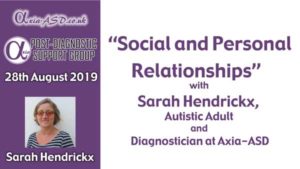 “Social and Personal Relationships”
“Social and Personal Relationships”
Wednesday’s talk was the first part of a presentation on “Social and Personal Relationships” given by Sarah Hendrickx, Autistic Adult and Diagnostician at Axia-ASD for Axia’s Post-Diagnostic Support Group.
This presentation was very interactive, and due to interesting discussion within the group, only the first couple of slides were able to be covered in the time available, therefore we will schedule the remainder of this talk for 2020.
“Social and Personal Relationships”
Axia Post-Diagnostic Support Group
August 2019
Sarah Hendrickx
Share This Post:







These PDSG are well worth looking out for. They can definitely brighten your day. I certainly had a few laughs with this one, but there was also some serious pause for thought too. Well-done the whole team!
For the remote participant, there is nearly always some mention of more recent research at the PDSG. I was especially interested in Linda talking about the oxytocin/cortisol dimension. I tend to hear comments at the PDSG and then go away and google them for extra details. I even found one site that suggested an excess of oxytocin might bring its own set of problems, in terms of increased envy and gloating. Something I’m sure we have all had to deal with at one time or another.
That’s an interesting thought regarding what too much oxytocin might bring
I wholeheartedly agree that the PDSG meetings are all valuable in many ways. The most recent one was both enlightening, uplifting and life affirming. I add my thanks to the Whole Team X
Another accidental find:
http://blogs.discovermagazine.com/d-brief/2019/09/06/testosterone-less-empathy-men/
Perhaps this casts some further doubt on Barron-Cohen’s Extreme Male Brain hypothesis. I noted this because one of my local GPs (about 3 years back)thought an inexpensive testosterone test from a local test lab might just conveniently indicate that I was only experiencing something like a mid-life crisis. 😉 The lab dashed off the blood test almost immediately, and even printed off a statement in English indicating very average to low testosterone levels in the blood for my age group. Oh well! That’s yet another attempted (and failed)deflection. There have been so many! 🙂
It’s great to hear everyone s thoughts
It was a great group for me too
I studied the science of deception, the speakers who were discussing lie types were on the right track. On average westerners lie once every seven minutes. Most of these are white lies such as the everyday:
“How are you?”
“Fine.”
When the speaker often isn’t. These are the social glue type lies and are used for social communication of all types to smooth relationships.
This is distinguished by deception – a lie made with the intention to obscure the truth or manipulate reality to the benefit of the deceiver.
I hope that distinction helps.
The two most common lie types are omission and evasion. This is used commonly by one of the classes of socially acceptable liars – the politician.